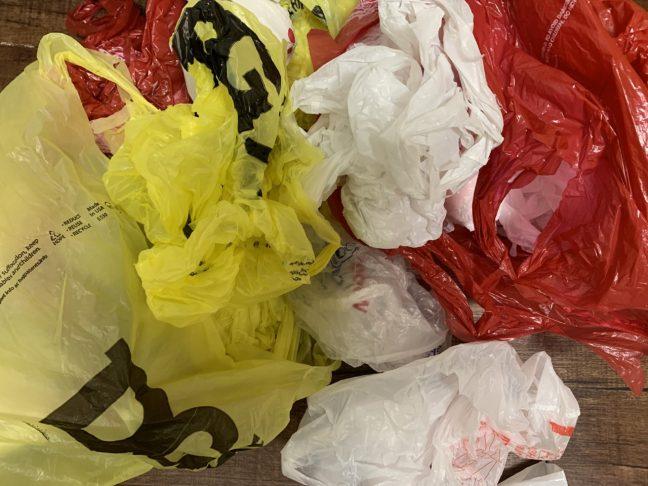As stores have begun to reopen over the past few months, I’m sure the pile of plastic shopping bags you’ve collected is growing larger and larger once again. But with Madison no longer collecting these plastic bags, what should Madisonians do with them?
Although they often seem trivial collecting dust in our homes — or when they just rip on your walk from the store to your car — these plastic bags can wreak havoc on recycling systems. Pellitteri, Madison’s recycling partner, has attempted to find a means to recycle the bags to no avail.
It doesn’t help China, one of the primary consumers of recycled plastic from the bags, is no longer importing the material. Between bogging down the recycling machines and no longer being able to sell the plastic, it was time for Pellitteri to end the program altogether.
Our city has yet to ban plastic bags altogether, but the examples from locales that have can give Madisonians a look into what to expect. Thus far, ten states — California, Connecticut, Delaware, Hawaii, New York, Maine, Oregon, New Jersey, Washington and Vermont — as well as countless other cities have banned the use of plastic bags outright. These bans are still relatively new, with the first occurring five years ago in California and the most recent being Vermont.
If home recycling is no longer an option, what should we be doing with the bags we collect? The easiest and most Earth-friendly way to discard your plastic bags is to take them back to a retail store, as many have plastic bag recycling programs in-house.
Stores that offer recycling programs include Metcalfes, Pick ‘n Save, Woodmans, Walmart and more — a full list is available on the Madison recycling website, available here.
If you can’t make the trip to recycle your plastic bags at stores, there are plenty of other options available as well. Plastic bags make unsurprisingly great storage tools, especially for those living in dorms or apartments with limited storage space.
Another easy option is to just stop using plastic bags whenever possible. Purchasing a reusable tote bag for use when making larger purchases eliminates the need to recycle the bag altogether.
With the city ending the recycling of plastic bags as well as encouraging shoppers to use reusable alternatives, some have begun asking why not take the next step and just ban the plastic bags outright. Simply put, the city can’t. Enacted in 2016, Wisconsin Act 302 effectively stops any municipality from banning plastic bags.
The law stops towns and cities from banning any container that might be used to carry food, beverages or other items from restaurants, bars or retail establishments. Madison ending the recycling program and making suggestions to citizens is about all the city can do while the state ties their hands preventing any city-wide policy.
Wisconsin is not alone in having preemptive laws ending any potential plastic ban. These preemptive laws are heavily lobbied by plastics companies as well as retailers. Retailers would rather have a state-wide law either banning or not banning plastics so they can operate uniformly.
The plastic companies are the ones really pushing for preemptive laws. In an attempt to save their profits, the companies have advocated strongly for preemptive bans. The lobbying has been clearly effective, with around 20 states adopting preemptive laws on plastic bans on the books.
It seems so ironic as I write this piece on Earth Day that so many people — in government or not — are posting about saving the planet as our state bends over backward to the plastics industry. Just a few weeks ago, Gov. Evers released his plans for expanding our state’s green initiatives.
With millions directed into countless green energy and climate change initiatives, it seems like it misses one of the most obvious places to start — everyday Wisconsinites. As important as promoting green energy is, there are so many ways to encourage more Earth-friendly behaviors in our everyday lives and a ban on plastic bags seems like the perfect place to start.
Wisconsin is home to many famous environmentalists. Our state gave birth to Gaylord Nelson, a U.S. Senator and founder of Earth Day who spent his time in politics promoting environmentalism and progressivism.
Wisconsin also saw the works of famed conservationist Aldo Leopold, who did a great deal of research just north of Madison in Baraboo, WI. It seems so backward to see a state, powered by its natural beauty and filled with a deep conservation and environmentalist history, be so corrupted by the plastics industry.
Madison may have only ended the recycling of plastic bags in the city, but it sets the groundwork for much-needed environmental reform. It seems simple or even pointless, but even a simple step like ending the use of these bags would go a long way to ending our plastic pollution problem.
A problem that has led to the poisoning of our oceans, with sea turtles snacking on our discarded plastic bags as they find their way into the oceans. It is time for our state to end its preemptive law regarding banning plastic bags. It’s one small step that will have a lasting positive effect on our planet’s ecosystems, for both mankind and for sea turtles.
Ryan Badger (rbadger2@wisc.edu) is a sophomore majoring in political science.


